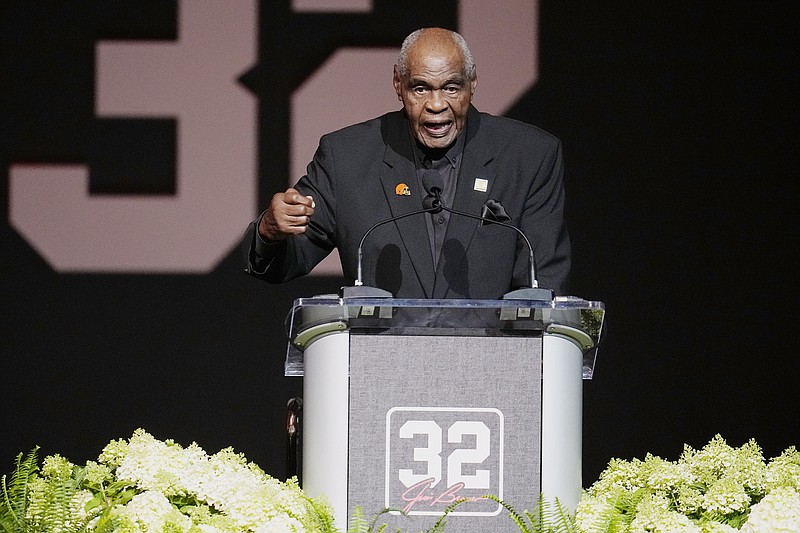In many respects, Jim Brown was more admired than respected, more feared than liked.
And that was before he gave up professional sports for the movies, seeking a fresh challenge as it were, after dominating the National Football League offensively like no player of his time.
Wearing No. 32 for the Cleveland Browns, he embodied a famous cartoon character, one that the late actors George Reeves and Christopher Reeve depicted on screen. Indeed, a piece of NFL film about Brown begins this way: "In the history of professional football there have been many super players, but only one super man: Jim Brown."
His records of 12,312 yards rushing and 126 touchdowns have been eclipsed. Indeed, the number of players who can tell of Brown's nine-year career -- eight seasons as the NFL's leading ground gainer -- are dwindling. Franco Harris, he of four Super Bowl titles with the Pittsburgh Steelers, the NFL team of the 1970s, preceded him in death late in the 2022 NFL season, almost 50 years to the day that he swooped into view to snare a deflected pass off the ground and score what's gone into history as "the Immaculate Reception" against the Oakland Raiders.
We can argue endlessly about Brown's place in NFL history, some perhaps holding out for Walter Payton or Emmitt Smith as the best running back of all time. Suffice it to say that Brown's name belongs near the top of the list and that it won't take long to call that roll.
He hung up his uniform after the 1965 season, which was also the first pro campaign for Dick Butkus, No. 51 of the Chicago Bears and considered the one defensive player who could have gone toe to toe with Bronko Nagurski. Also considered the greatest lacrosse player of his time, Brown proved more watchable on screen than one might remember.
Brown's screen character died in his first movie, "The Dirty Dozen" from 1967, starring alongside Charles Bronson and Ernest Borgnine. That screen year is remembered more for "Bonnie and Clyde" and "The Graduate," among other films, with Best Picture going to "In the Heat of the Night," one of Sidney Poitier's three starring roles in '67 as the screen's premier Black star.
Brown's career led to a series of "Blaxpoitation" roles, of which "Black Gunn," opposite baseball star Vida Blue and others faces from the early 1970s, perhaps is worth a rental. We are not talking here about John Shaft, played to a fare-the-well by Richard Roundtree in three films.
No Oscar did Brown win and no film does he deserve to have his name mentioned alongside. Billy Dee Williams came to give Hollywood a suitable Black alternative for Brown, a role now occupied by Oscar winners Will Smith, Jamie Foxx and others, Denzel Washington masterfully playing Malcolm X under Spike Lee's direction.
Brown, who died in May at age 87, is being lauded this week in Canton, Ohio, where another class receives induction to the Pro Football Hall of Fame. He is remembered for seeking peace among gang members in Los Angeles, less so for incidents of domestic abuse for which he was charged.
"He transcended football," said Browns owner Jimmy Haslam, a featured speaker this week in Canton with such as Commissioner Roger Goodell and comedian Dave Chapelle.
I became aware of Brown's impact beyond any doubt when several years back former teammate Bobby Mitchell returned to Hot Springs, his hometown, for an honorary weekend. The Browns drafted Mitchell, a former Langston High star, out of Illinois, then traded him to the Washington Redskins, for whom he became the first member of his race to play and later served in the front office. To his credit, Mitchell would not let me goad him into negative remarks about Brown -- and there were many in the air. His admiration for the man, both as a player and social force, remained inviolate.
Indeed, one remembers Brown posing with Mitchell, Muhammad Ali, Bill Russell and a young Kareem Abdul-Jabbar in a Sixties summit of Black athletes. Topics under discussion included whether Ali, the heavyweight boxing champion, should enter the military draft, as the United States government requested, and if Abdul-Jabbar, then doing business as Lew Alcindor, might play in the Mexico City Olympics.
Brown answered the bell that day. I was not then in my teens, yet someone now in his 60s considers the opportunity to watch Brown play on TV each Sunday one of my greatest childhood experiences. A child then grew up wanting to be Mickey Mantle, hitting home runs from both sides of the plate, or Jim Brown in his Superman outfit. Feel free to disagree but there has not been another like him, on or off the field.
